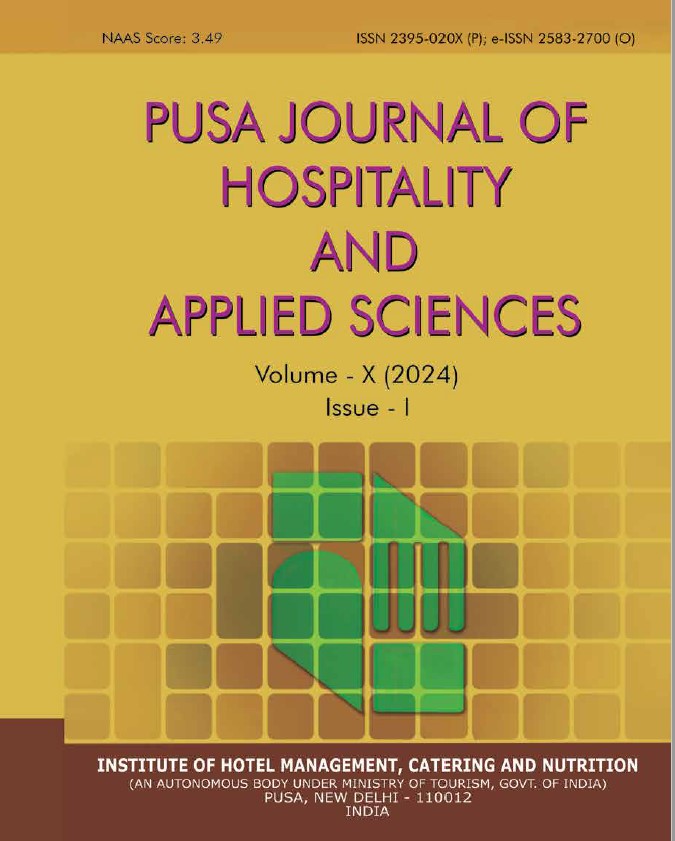Awareness And Knowledge Of The Hospitality Instructors Of Probiotic Beverages
Keywords:
Functional Beverages, Probiotics, Nutritional Value, Hospitality InstructorsAbstract
Background: In today’s world there is an imbalance in the intestinal bacteria. Sedentary lifestyle and poor sleeping schedule have affected our entire body. Apart from that we are regularly consuming unhealthy diets which are low in fiber and high in processed foods and added sugar. Intake of probiotics will be led to the development of intestinal immune system which regulates the intestinal bacteria. Objectives: To check the awareness and knowledge of the Food & Beverage Instructors working in Hospitality Institutions/colleges/universities about probiotic beverages and to check the need of incorporating the concept of probiotics in the curriculum of the hospitality students. Methodology: To fulfill the objective of this research paper we used both primary and secondary data. Numbers of respondent were 77. The respondents were Food and Beverage department instructors working at different Institutes of Hotel Management across India. For primary data collection, a structured questionnaire was designed and sent to Food and Beverage instructors/trainers/lecturers/teachers in the hospitality institutes. Percentage Analysis was done for the calculation of data. Results: The faculty members are very well aware about the concept of probiotic beverages. The results clearly state that not much attention has been paid to the concept as most of the faculty members have not taken theory and practical classes on this topic. However, they intend to take this concept in the future. Conclusion: It can be concluded that despite the knowledge that the faculty members have, for probiotic beverage more attention needs to be given on teaching the concept of probiotic to the hospitality students as due to the current scenario customers are more inclined towards the beverages which along with satisfying their palate provides nutritional benefits to them.
References
Baba, A.S., Najarian, A., Shori, A.B. Lit, K.W., & Keng, G.A. (2 014), Viability of lactic acid bacteria, antioxidant activityand in vitro inhibition of angiotensin-I converting enzyme of lyceum barbarum yogurt. Arab. J. Sci. Eng., 39, 5355–5362.
Barbano, D.M. (2017). A 100-year review: The production of fluid (market) milk. J. Dairy Sci, 100, 9894–9902.
Chandrasekara, A., & Shahidi, F. (2018). Herbal beverages: Bioactive compounds and their role in disease risk reduction–A review. J. Tradit. Complement. Med. 8, 451– 458.
Choi, J.-W., Kang, H.W., Lim, W.-C., Kim, M.-K., Lee, I.-Y.,& Cho, H.-Y. (2017). Kefir prevented excess fat accumulationin diet-induced obese mice. Biosci. Biotechnol. Biochem, 81, 958–965.
Corbo, M.R., Bevilacqua, A., Petruzzi, L., Casanova, F.P., & Sinigaglia, M. (2014). Functional beverages: The emerging side of functional foods commercial trends, research, and health implications. Compr. Rev. Food Sci. Food Safety, 13, 1192– 1206.
Ghoshal, G. (2019). Chapter 4–Beverages: A potential delivery system for nutraceuticals. Nutr. Beverages, 12, 1111–1142.
Hill, C., Guarner, F., Reid, G., Gibson, G.R., Merenstein, D.J., Pot, B., Morelli, L., Canani, R.B., Flint, H.J., & Salminen, S. (2014). The international scientific association for probiotics and prebiotics consensus statement on the scope and appropriate use of the term probiotic. Nat. Rev. Gastroenterol. Hepatol, 11, 506–514.
Jalali, F., Sharifi, M., & Salehi, R (2016). Kefir induces apoptosis and inhibits cell proliferation in human acute erythroleukemia. Med. Oncol, 33, 7.
Kandylis, P., Pissaridi, K., Bekatorou, A., Kanellaki, M., & Koutinas, A.A. (2016). Dairy and non-dairy probiotic beverages. Curr. Opin. Food Sci, 7, 58–63.
Nigam, D. (2018). Probiotics as functional foods in enhancing gut immunity. In Functional Food and Human Health; Rani, V., Yadav, U.C.S., Eds.; Springer: Singapore.
Orrù, S., Imperlini, E., Nigro, E., Alfieri, A., Cevenini, A., Polito, R., Daniele, A., Buono, P., & Mancini, A. (2018). Role of functional beverages on sport performance and recovery. Nutrients, 10, 1470.
Rioux, K.P., Madsen, K.L., & Fedorak, R.N. (2005). The role of enteric microflora in inflammatory bowel disease: Human and animal studies with probiotics and prebiotics. Gastroenterol. Clin. N. Am, 34, 465–482.
Sanguansri, L., & Augustin, M.A. (2010). Microencapsulation in functional food product development. In Functional Food Product Development; Smith, J., Charter, E., Eds.; John Wiley and Sons: New York, NY, USA,3–23.
Slavin, J. (2013). Fiber and prebiotics: mechanisms and health benefits. Nutrients; 5:1417e35.
Sun-Waterhouse, D. (2011). The development of fruit-based functional foods targeting the health and wellness market: A review. Int. J. Food Sci. Technol., 46, 899–920.
Ton, A., Campagnaro, B., Alves, G., Aires, R.,Côco, L., Arpini, C., Oliveira, T., Campos-Toimil, M., Meyrelles, S., & Pereira, T. (2020). Oxidative stress and dementia in alzheimer’s patients: Effects of synbiotic supplementation. Oxid. Med. Cell Longev. 1–14.
Yadav, R., Puniya, A.K., & Shukla, P. (2016). Probiotic properties of lactobacillus plantarum RYPR1 from an indigenous fermented beverage raabadi. Front. Microbiol., 7, 1683.
Zhang, J., Zhao, X., Jiang, Y., Zhao, W., Guo, T., Cao, Y., Teng, J., Hao, X., Zhao, J., & Yang, Z. (2017). Antioxidant status and gut microbiota change in an aging mouse model as influenced by exopolysaccharide produced by Lactobacillus plantarum YW11 isolated from Tibetan kefir. J. Dairy Sci. 2017.




